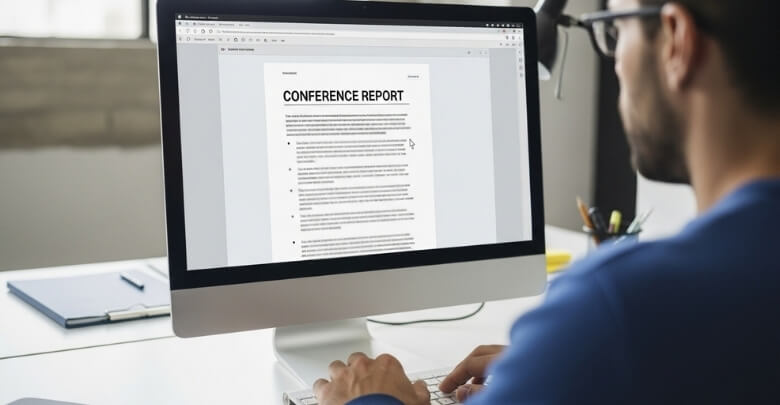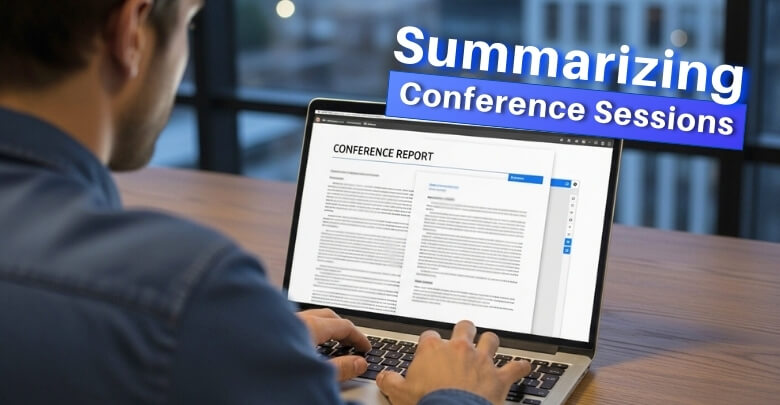A conference report is not just a story about an event. It is a useful way to remember what happened and share it with others. If you have been to a conference and now want to write about your experience, you might be thinking: How to write a conference report after attending it by yourself?
To write a conference report, first write the event name, the date, and your name. Then give a short introduction. Summarize the main sessions and the most important points you learned. Mention key speakers, note any important people you met, and finish with your own thoughts and ideas for the future.
Not sure how long the report should be or if you should add pictures? Keep reading. This article will guide you step-by-step to writing a clear and complete conference report from start to end.
How to Write a Conference Report?
Writing a good conference report is not just about remembering what happened. It is about explaining it in a clear way so someone who was not there can understand. Whether you are writing for school, work, or yourself, here is an easy step-by-step guide.

Step 1: Add Title and Event Details
You’ll want to begin with the basic details. Write a clear and direct title that includes the name of the conference. After that, include the full name of the event, where and when it took place, and your name and role. If you’ve attended international events like conferences in Canada, this info helps readers take your report seriously right from the beginning.
Step 2: Write a Short Introduction
Say why you went to the conference. Mention who organized it and what it was about. Link the event’s purpose to your studies, work, or goals. Keep it short — two or three sentences are enough.
Step 3: Summarize the Main Sessions
Pick the sessions you liked the most. Say what they were about and who spoke. Use short paragraphs or bullet points. If something was exciting or surprising, include it. Keep your summary simple and easy to read.
Step 4: Share the Main Lessons
Write about what you learned. It could be a new idea, skill, or tool. Say how you might use it in your studies or work. Keep it clear and useful.
Step 5: Talk About Key Speakers
Instead of listing names, say what the speakers talked about. If a keynote speaker shared something inspiring, write about it. Use your own words to explain their ideas. You can add a short quote if it was memorable.
Step 6: Mention People You Met
Networking is a big part of conferences. Write if you met people from interesting fields. You don’t have to name everyone. Just say the type of people you met and if you plan to keep in touch.
Step 7: List Event Materials
If you collected handouts, slides, photos, or brochures, mention them. Say if you will share them or keep them for yourself. If there were QR codes or online links, include them if they are allowed to be shared.
Step 8: Say What Worked Well
Talk about things that were done well. Maybe the event was on time, the venue was nice, or the online platform worked smoothly. Include small details that might help others who plan a similar event.
Step 9: Give Your Final Thoughts
Say if the event was worth attending. Write whether you would join again or recommend it to others. Add any advice or next steps. Keep it short but honest.
Step 10: Use a Report Template
If you don’t know where to start, use a ready-made conference report template. It helps you stay organized and saves time. Just fill in each part with your own words. To help you get a clear idea, here is how to write a conference report example:
Conference Title: ___________________________
Date: ______________________________________
Venue: _____________________________________
Your Name & Role: __________________________
Purpose of Attending:
[2–3 sentences explaining why you attended]
Conference Overview:
[Brief summary of topics and structure]
Session Summaries:
- Title — Speaker
– Main idea: ___________
– Key points: • ____ • ____ • ____
– Example/quote: ___________
- [Repeat for each session]
Key Takeaways:
– ___________________
– ___________________
– ___________________
Networking & Connections:
– ___________________
– ___________________
Resources & Materials:
– ___________________
What Worked / Could Improve:
– Worked: ______________
– Improve: _____________
Final Verdict & Recommendations:
[1 paragraph with overall opinion and advice]
Common Mistakes (and How to Fix Them)
Writing a conference report seems straightforward, but even experienced attendees often fall into these traps. Below are the most common mistakes, plus clear fixes so your next report is both engaging and useful.
Mistake 1: Listing Every Session You Attended
Trying to cover every single talk turns your report into an overwhelming, diary-style log. Readers—especially colleagues who weren’t there don’t have the time or patience to read through pages of chronological notes. This approach buries the most important insights under a mountain of less relevant details.
How to fix it:
Identify the top 3–5 sessions that had the greatest relevance to your work, industry, or audience. Prioritize sessions that introduce new strategies, innovative tools, or inspiring case studies. Summarize each of these in a short, structured format (title, speaker, main idea, 2–3 key points, notable example). This keeps your report focused, digestible, and impactful.
Mistake 2: Writing Vague or Generic Takeaways
Phrases like “It was inspiring” or “The talk was informative” don’t tell the reader what you actually learned or how it applies to real life. Generic takeaways fail to capture the value of your attendance and make the report forgettable.
How to fix it:
Tie every takeaway to a specific action or change it will inspire. For example:
- Weak: “The session helped me think differently about data.”
- Strong: “The session showed me a 3-step framework for building dashboards, which I will test in our Q4 analytics review.”
Linking insights to action proves you are engaged with the content and helps others see its practical value.
Mistake 3: Starting With a Rambling, Overly Long Introduction
Many reports spend the first few paragraphs describing the trip, the venue, or personal impressions before mentioning the event’s purpose. This delays the core information and risks losing the reader’s attention.
How to fix it:
Keep your introduction to 2–3 tight sentences:
- Name the conference and who organized it.
- State your reason for attending.
- Briefly mention the main theme or goal.
Example:
“I attended the 2025 Global Marketing Summit, hosted by the Digital Strategy Association, to learn about emerging AI tools for content marketing. The event focused on practical case studies and future trends in automation.”
This way, the reader immediately knows what the report is about and why it matters.
Mistake 4: Adding Too Many Visuals Without Purpose
Photos, charts, and screenshots can enhance a report but overloading the document with visuals can make it feel cluttered and distract from the main message. Irrelevant or low-quality images (blurry photos, filler stock pictures) make the report look unprofessional.
How to fix it:
Be selective and intentional with visuals:
- Use 1–2 images that directly illustrate a point (e.g., a clear photo of the keynote speaker, a chart summarizing survey results).
- Caption each visual so readers understand its relevance.
- Compress large image files so the report loads quickly if shared digitally.
Ask yourself before adding an image: “Does this make the content clearer or more memorable?”
Mistake 5: Skipping Your Final Verdict or Recommendation
Some reports end abruptly after the session summaries, leaving the reader without a conclusion. Without your verdict, the report feels incomplete and fails to convey whether attending was worthwhile.
How to fix it:
Always close with a clear, concise opinion:
- Was the event worth your time and resources?
- Would you attend again?
- Who would benefit most from attending next time?
Example:
“Overall, the conference exceeded my expectations. I recommend it to marketing leaders exploring AI adoption, as the practical case studies and networking opportunities were excellent. I plan to apply at least three of the frameworks shared in our upcoming campaigns.”
A thoughtful conclusion leaves a strong final impression and helps decision-makers evaluate future participation.
Avoiding these mistakes will keep your conference report focused, professional, and valuable. Think of your report as a highlight reel, clear, structured, and actionable rather than a raw transcript of the event.
How to Summarize Conference Sessions Effectively in Your Conference Report?
Summarizing a conference session isn’t just about copying what was said — it’s about distilling the session into its most valuable points so someone who wasn’t there can still understand the essence and importance of it. A good summary is short, clear, and highlights why the session mattered. Here’s the step-by-step method to write an effective session summary, with a live example:
Start With the Session Title and Speaker
Always begin with the full title of the session and the speaker’s name. This immediately anchors the reader in the right context.
Example:
Session: Designing with Data — Dr. Ayesha Karim
Identify the Main Idea
Write 1–2 sentences summarizing the session’s central theme or takeaway. Avoid jargon unless you briefly explain it.
Example:
Main idea: How lightweight dashboards help non-analysts act on feedback.
Why this works: It tells the reader in plain language what the session was about without overloading them with details.
List 2–4 Key Points
Pull out the most important and actionable ideas from the talk. Each point should be one clear sentence, preferably in bullet form for easy scanning.
Example:
Key points:
- Start with the decision, then choose the metrics.
- Keep dashboards to one screen for quick scanning.
- Assign an action owner and a deadline for each chart.
Why this works: The bullets keep things concise while showing exactly what was learned.
Include a Memorable Example or Quote
If the speaker used a story, case study, or powerful quote, include it briefly. It makes the summary more relatable and memorable.
Example:
“A dashboard should answer a question in 30 seconds or less.”
Add Your Personal Application
Conclude the summary with how you’ll use this knowledge or why it’s valuable. This personal angle makes the summary unique and shows that you engaged with the content.
Example:
How I’ll apply it: I’ll rebuild our sprint review slide with a single-screen dashboard and add action assignments for each metric.
Keep it Brief but Complete
A well-written session summary should be 100–150 words max. Enough to capture the main points, but short enough to read quickly.
Complete Example Using This Method
Session: Designing with Data — Dr. Ayesha Karim
Main idea: How lightweight dashboards help non-analysts act on feedback.
Key points:
- Start with the decision, then choose the metrics.
- Keep dashboards to one screen for quick scanning.
- Assign an action owner and deadline for each chart.
Quote: “A dashboard should answer a question in 30 seconds or less.”
How I’ll apply it: I’ll rebuild our sprint review slide with a single-screen dashboard and add action assignments for each metric.
Difference Between a Conference Summary and a Report
Some people think all conference write-ups are the same, but that’s not true. Summaries, notes, and full reports each have their own purpose and use. Knowing the difference helps you choose the right one. Let’s break them down clearly below.
Purpose and Focus
Every type of write-up has a different goal. Notes are mainly for yourself—they help you remember what was said. A conference summary report is for sharing key ideas in a short format, often just a few lines. A report is more detailed, usually made for official use. It covers everything from what happened to what it means. Each one fits a different need depending on who will read it.
Detail and Length
What you include depends on how much detail is needed. Notes are short and messy, just points that make sense to you. Summaries are a bit longer and better organized. Reports are the longest. They are neat, well-structured, and explain everything clearly. If you’re writing a conference recap for your team, you’re likely focusing on quick highlights, while a full report usually includes detailed analysis and formal structure.
Tone and Language
These types use different styles. Notes can be casual because only you might read them. A summary is simple but still clean because it’s often shared with others. Reports use proper sentences and full paragraphs. They may also include facts, quotes, and even feedback from others. Choosing the tone depends on who the reader is.
Structure and Format
Each type is built differently. Notes don’t follow a fixed structure. You write what you think is important. Summaries follow a short format with main ideas. Reports are longer with headings, subheadings, and sometimes tables or bullet points. Reports also end with final thoughts or recommendations. So, how you write depends on the type you are making.
When to Use
Think about the reason you’re writing. If it’s just to remember something, take notes. To share the main points quickly, write a summary. Use a full report when your task is to explain everything properly for future use. Each one is helpful in its own way, so pick what fits the situation best.
Should You Add Personal Insights in a Conference Report?
Absolutely, personal insights can turn a standard conference report into something memorable and uniquely valuable. Facts tell the reader what happened, but your reflections explain why it mattered and how it connects to practical applications. This gives your report personality, credibility, and context.
Why Personal Insights Matter?
- Show Genuine Engagement: They prove you were actively listening and processing the content.
- Add Meaning for Others: Your perspective helps readers understand the impact beyond the basic agenda.
- Make Your Report Stand Out: Anyone can list sessions; only you can share your own takeaways.
- Help Organizers Improve: Your reflections can double as a way of providing conference feedback, highlighting what worked well and where there’s room for improvement.
How to Add Personal Insights? (Without Overdoing It)
- Connect to Your Role or Goals: Relate each takeaway to your work, studies, or future plans.
- Share Application Plans: Explain briefly how you’ll use a concept, tool, or idea you learned.
- Balance Praise and Critique: When providing conference feedback, keep comments constructive and focused on helping improve future events.
- Stay Relevant: Avoid going off-topic or making it about unrelated experiences.
Example of a Personal Insight in Action
Key takeaway: “The session on AI in marketing gave me a clear framework for prioritizing tools based on ROI. I’ll be using this framework in our Q3 campaign planning to ensure we invest in the most impactful platforms. This was one of the most practical takeaways, and I’d recommend the organizers include similar strategy-focused talks in the future.”
Pro Tip: Limit personal insights to 1–2 sentences per section. This keeps your report focused while still showing your unique perspective, while also allowing you to give subtle but meaningful conference feedback in the process.
How Long Should a Conference Report Be?
The length of a conference report can vary depending on its purpose, audience, and the depth of information required. Here’s a general guideline to help determine an appropriate length:
| Report Type | Word Count | Purpose |
| Brief Summary | 300–500 words | For internal updates or quick overviews. |
| Standard Report | 1,000–2,000 words | Suitable for sharing key insights with colleagues or stakeholders. |
| Comprehensive Report | 2,000–4,000 words | Detailed analysis for publication or archival purposes. |
Tips for Determining Report Length:
- Audience Consideration: Adjust the depth and length based on who will read the report. Executives may prefer concise summaries, while academic peers might expect detailed analyses.
- Purpose of the Report: Clarify whether the report is for internal knowledge sharing, academic publication, or stakeholder briefing, as this will influence its length and detail.
- Content Scope: Focus on summarizing key sessions, insights, and takeaways rather than providing exhaustive details of every presentation.
- Clarity and Conciseness: Regardless of length, ensure the report is well-structured, clear, and free of unnecessary jargon or filler content. Choosing the right conference report format can also help present your insights in a way that’s easy to follow and tailored to your audience.
Remember, the quality of insights and clarity of presentation are more important than the length of the report. Aim to provide valuable information that meets the needs of your intended audience.
FAQs About Writing Conference Report
Writing a conference report often raises small but important questions that aren’t always covered in general guides. Here are six additional FAQs to help you prepare a clear, effective, and professional attendee report without missing key details.
How Soon Should I Write My Conference Report?
It’s best to write your report within 24–48 hours while details are fresh. This ensures accuracy, captures your authentic impressions, and helps you organize session notes before you forget important examples, quotes, or networking contacts.
Can I Combine Notes From Multiple Days Into One Report?
Yes, combining multiple days is fine if you organize the report clearly. Use subheadings for each day or theme so readers can follow the timeline while still getting a single, cohesive document that covers the entire event.
Should I Include Session Attendance Numbers?
If attendance is relevant—such as for highlighting interest in certain topics—it’s worth adding. Include approximate counts or “full room” descriptions to give context, but keep it brief and tie it to why the session’s popularity mattered.
How Do I Handle Overlapping Sessions I Couldn’t Attend?
Mention that you missed those sessions and, if possible, link to official slides or recordings. You can also ask colleagues who attended for their notes, ensuring your report still covers the event comprehensively without guessing content.
Is It Helpful to Include Links to Speaker Profiles?
Yes, linking to speaker bios or LinkedIn pages can help readers learn more about them. It adds credibility, encourages networking, and provides additional context, especially when the speaker’s expertise or background is central to your summary.
Should I Archive My Conference Reports?
Definitely. Keeping a personal archive helps you track professional growth, remember past learnings, and prepare for future events. An organized digital folder allows easy access to past insights, templates, and contact lists whenever needed for reference.
Last Words
A good conference report is a simple way to remember what happened and share it with others. It keeps the most important points, lessons, and people you met in one place. By knowing how to write a conference report, you can make it clear, interesting, and useful for anyone who reads it.
Choose the best sessions to talk about, explain what you learned, and add your own thoughts. With a little practice, you will get faster and better at it. Use the ideas in this guide to create reports that show why the event was worth attending.








